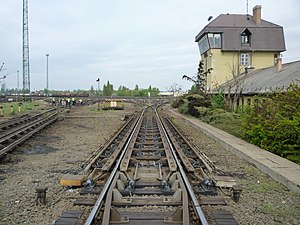Proposal:Weight station
| Weight station | |
|---|---|
| Proposal status: | Inactive (inactive) |
| Proposed by: | FrViPofm |
| Tagging: | amenity=weight_station |
| Applies to: | |
| Definition: | Tagging features of a weight station |
| Statistics: |
|
| Draft started: | 2022-08-10 |
There are places for weighting cars, trucks, wagons... all over the world, but I did not find a way to map them in OSM.
They are historic weight houses.
Those sites involve several items that can be mapped separately, mainly :
- a portion of road, rail road, maybe good conveyors for accessing the weight scale
- a weighbridge (truck scale in US), or railroad scale
- a cabin ( the Weigh house) with
- the reading disposal, indoor or outdoor, electronical or mechanical
For non English natives, the expressions with scale only (truck scale, railroad scale) are error prone as they don't mention the implied weighting scale.
Tagging
In use weight stations
As sites, those weight stations should be tagged as relation ![]() type=site offering the amenity=weight_station if in use. The other information can be set with the existing tags access=*, opening_hours=*, maxweight=*, operator=*, contact:phone=*... The relation can have as members :
type=site offering the amenity=weight_station if in use. The other information can be set with the existing tags access=*, opening_hours=*, maxweight=*, operator=*, contact:phone=*... The relation can have as members :
- The cabin if exists, mapped as a polygon
 (or node
(or node  ), tagged as building=weight_house. This same tag can be put on historic weigh house no more in use with the appropriate historic=*, heritage=*
), tagged as building=weight_house. This same tag can be put on historic weigh house no more in use with the appropriate historic=*, heritage=*
- The portion of way connected to the highway or railway network, mapped as way
 , tagged highway=service or railway=service and service=weightbridge
, tagged highway=service or railway=service and service=weightbridge
- The reading device, mechanical or electronic, mapped as a node
 , usually inside the cabin, tagged with man_made=weighting_scale. The use of the man_made=weighting_scale is for employing a tag that could be use in railway stations, airports for baggages, in pharmacies for people, in factories for goods...
, usually inside the cabin, tagged with man_made=weighting_scale. The use of the man_made=weighting_scale is for employing a tag that could be use in railway stations, airports for baggages, in pharmacies for people, in factories for goods...
Historic weight stations
If the site is no more in use, the relation can have a historic=weight_station instead of the amenity and the weightbridge is tagged as historic. This happens often in France in villages.




